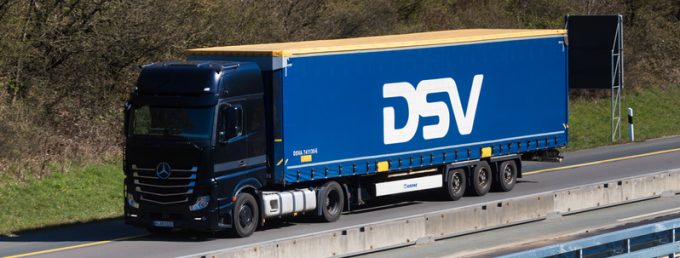DSV is to pass on rising haulage costs to its customers, but has downplayed suggestions it has been significantly affected by the shortage of drivers.
Road accounts for more than 20% of DSV’s revenue and has seen 12.4% growth in the year to date.
It recorded revenue of Dkr1.74bn ($272m) in the third quarter and ebit of Dkr465m, saying its position as a market leader had helped it secure road capacity, although rates are rising.
But CEO Jens Bjørn Andersen acknowledges that Europe is facing a shortage of drivers.
“We see more and more the situation of a lack of capacity and drivers. We will find the capacity we need, but at higher prices than we have seen before.”
He added the new EU legislation, which covers cabotage, driver’s rest and postings, had exacerbated the problems.
“More legislation and regulation won’t ease the market and rates, and prices will definitely go on rising. We are committed to passing that on to our customers, they should have that burden.”
He added that new rules on drivers returning home also had a negative effect on the climate.
According to forwarder organisation Clecat, Poland is suffering the most in Europe, needing 124,000 drivers, the UK 76,000 and Germany between 45,000 and 60,000.
Mr Andersen said the shortage in the Polish market “is very different to five to 10 years ago. It’s more problematic to find drivers”. The UK, meanwhile, has its own issues, he added.
“The UK is not a preferred destination for any asset owner. It gets the highest rates out of Asia to Felixstowe, because of inefficiencies at the ports. The same goes for hauliers. It’s super complicated from a customer point of view, and it has caused some problems. The utilisation of trucks is lower – and we pay by the mile. It’s a difficult market.
“We do have unaccompanied freight from the Nordics to UK, and we are doing OK in the UK – and I do know how hard they are working there. We are the market leader in the UK, but the question is what overall volumes are going in and out, I am not sure of that. But it’s less than 5% of our overall volumes.”
Data from visibility platform FourKites over the past four months shows the UK has seen a decline of 5%, to 15%, in full truckload shipments, while less-than-truckload (LTL) has risen between 10% and 20%.
Noting the lack of drivers, which led to a fuel supply issue, FourKites noted: “Taken in this context, a shift from FTL to LTL makes sense as a more efficient consolidation of goods. Shippers and carriers may be switching to LTL in order to save money.
“With the current market situation, it is very important to utilise all free space in trailers. Consolidation of goods requires better planning.”
DSV’s road division operates more than 20,000 trucks, offering full-load, part-load and groupage services through a network of more than 200 terminals. It estimated that the market grew 5% year on year, to 8%, in the first nine months of 2021.
Reference: https://theloadstar.com/driver-shortages-and-rising-costs-make-the-uk-a-tough-market-says-dsv-chief/

